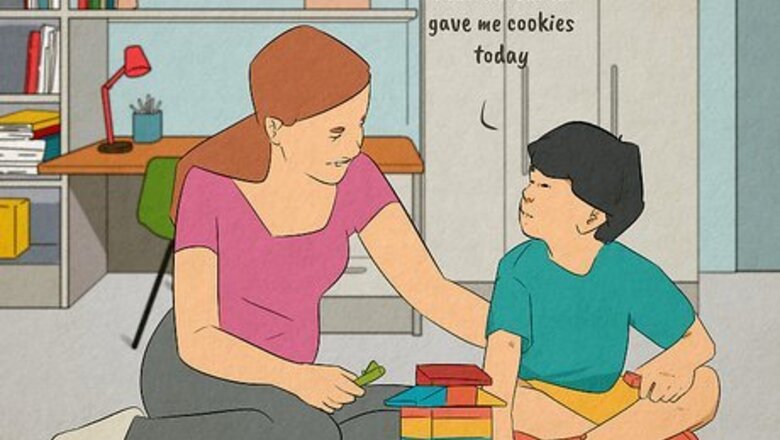
views
- “Mama” and “momma” are diminutives of the word “mother,” and they’re both commonly used to refer to someone’s mother.
- “Mama” originated in the 1500s and is the more popular term worldwide. Etymologically, it’s based on the sounds babies make since “ma” is easy to pronounce.
- “Momma” is a variant of “mama” usually associated with American English and the southern United States (US), although it’s used in other places too.
Is “Mama” or “Momma” correct?

“Momma” and “mama” are both correct and can be used interchangeably. In the English language, “mama,” “momma,” and even “mamma” all mean the same thing! Though they have different spellings, they're both shortened versions of the word “mother." Either version of the word might be used based on the culture and region the speaker originates from. For example: “My mama is the smartest person I know!”“John’s momma gave me cookies today.” Some dialects place emphasis on the short “a” sound, while others over-emphasize long “a” sounds—so the words sound a little different based on geography. However, the basic pronunciation for both words is very similar: (/ˈmɑː.mə/, or “mah-ma”).
What’s the difference between “Momma” and “Mama”?

“Mama” is the original spelling of the word, originating in the 1500s. The etymology of “mama” comes from the way human babies learn languages, as “ma” is one of the easiest sounds for them to replicate and learn. Thus, because the sound is also easy to repeat, “mama” became an informal variation of “mother.” Babies and young children often refer to their mothers as “mama,” even if they end up using a different word later on. However, “mama” isn’t exclusively used by young children; anyone can refer to their mother as “mama.” “Mama” is the more common spelling of the word in the United Kingdom, though it can be found in many languages worldwide!

“Momma” is a variant of “Mama,” more common in American English. First used in the 1800s, “momma” is actually just a different way to spell “mama” and is considered even more informal than “mama” (although both are casual compared to “mother”). The spelling of “momma” is typically associated with the southern United States, but it’s used in other regions of the world, too. Some prefer “momma” because it’s closest in spelling to the word “mom” (which is a very common term for “mother” in the US). While “mama” is more common worldwide, you could still write “momma” and be understood in any English-speaking area.

In colloquial slang, both words also refer to an attractive, mature woman. You might also hear someone call a woman “mama” or “momma” when that woman isn’t actually their parent. That’s because (particularly in the US), “mama” and “momma” are slang terms that can be used to address any woman who is mature, middle-aged, or sometimes older. For example, you might hear someone call their wife or girlfriend a “hot little momma” or say, “Looking good, mama!” In those cases, “mama” and “momma” are still affectionate words; they’re just not being used to acknowledge someone as a mother.
When to Use “Mama” and “Momma”

Both words can be used as a term of endearment and respect. When referring to someone in writing, all forms of “mama” (“momma,” “mamma,” and so on) are correct. Just make sure you’re using the same version of the word throughout your writing—not saying “mama” at the beginning of a note and “momma” later. All versions of “mama” should be capitalized when referring to a person in place of their name because that makes the word a proper noun. On the other hand, you don't have to capitalize "mama" or "momma" when describing a generic parental relationship. For example, you don’t have to capitalize “mama” when writing, “I’m not your mama, do it yourself!” However, it’s appropriate to capitalize “mama” when writing, “Hi, Mama! How are you?”
Which word should you use?

Use the term you like best or the one your mother prefers. Since both words are correct and the pronunciation and spelling of “mama” and “momma” usually depend on where you were born and raised, it’s entirely up to you which one you use. In many cases, your mother might even just show you the spelling she wants you to use! Here’s how you might use both words: “Can’t wait to head to the family reunion with my mama!”“I’m moving out of my mama’s house soon, but I’ll miss being close to her.” “I’ll be playing hooky and going to a museum with my momma tomorrow.”“Momma, what recipe do you use for roasted vegetables?”
Related Words

“Mum” and “Mummy” are popular versions of “Mother” in British English. Neither “mama” nor “momma” are the most popular words for “mother” in the United Kingdom, Australia, New Zealand, and Canada. Rather, they use “mum” (instead of “mom”) and “mummy” (instead of “mommy”) to refer to mothers. In French-speaking Quebec (in Canada), “maman” is also used (since it’s the French word for “mother.”) However, all of these words mean the same thing; the only difference is their spelling!

“Mother” has many different variations beyond “Mama” or “Momma.” Some mothers go by the diminutive of mama, “ma,” while others use “mother,” the formal version of the word. “Mother” has many diminutive forms, from “ma” to “mamma,” “mom,” and “mommy.” Interestingly, “mama” is used in some form across many different languages—not just English. For example: Spanish: Mamá French: Maman Swedish: Mamma Portuguese: Mamãe Czech: Máma Russian: мама Swahili: Mama




















Comments
0 comment